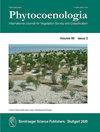种子萌发生态学及其净化阶段对埃塞俄比亚两种地方竹种离体种子萌发性能的影响
IF 0.9
4区 生物学
Q4 ECOLOGY
引用次数: 0
摘要
本文章由计算机程序翻译,如有差异,请以英文原文为准。
Effects of seed germination ecology and its cleaning stage on in vitro seed germination performance of two indigenous bamboo species in Ethiopia
求助全文
通过发布文献求助,成功后即可免费获取论文全文。
去求助
来源期刊

Phytocoenologia
生物-植物科学
CiteScore
2.60
自引率
0.00%
发文量
7
审稿时长
>12 weeks
期刊介绍:
Phytocoenologia is an international, peer-reviewed journal of plant community ecology. It is devoted to vegetation survey and classification at any organizational and spatial scale and without restriction to certain methodological approaches. The journal publishes original papers that develop new vegetation typologies as well as applied studies that use such typologies, for example, in vegetation mapping, ecosystem modelling, nature conservation, land use management or monitoring. Particularly encouraged are methodological studies that design and compare tools for vegetation classification and mapping, such as algorithms, databases and nomenclatural principles. Papers dealing with conceptual and theoretical bases of vegetation survey and classification are also welcome. While large-scale studies are preferred, regional studies will be considered when filling important knowledge gaps or presenting new methods.
 求助内容:
求助内容: 应助结果提醒方式:
应助结果提醒方式:


